- Home
- Carol Higgins Clark
Iced Page 14
Iced Read online
Page 14
“Louis, this is great.”
“Now I’ve paid you back for yesterday.”
“Of course, doll. You’ve made my life worth living. I’ll leave now,” Regan said, standing up. “Oh, I want to quickly call Yvonne Grant and see if she found Bessie’s number.”
“Here,” Louis said, handing her the phone. “And then get out of here. You’re making me nervous.”
“I thought you liked having me here,” Regan said in mock protest.
Louis came around the desk and gave her a kiss on the cheek. “You can come here anytime.”
Yvonne answered the phone and told Regan that she couldn’t find Bessie’s cousin’s number in Vail. “I thought we had it written down on a piece of paper in a drawer in the kitchen.” Her laugh could not conceal a touch of annoyance. “Since I’m not too familiar with the kitchen… Bessie is in charge of everything around here and I don’t know where she would have left it. She’s due back on Thursday. Can you wait until then?”
Regan was disappointed but kept it out of her voice. “Sure. But if you hear from her, ask her to call me at Louis’s.”
“Okay. You’ll be at Kendra’s for dinner?”Yvonne asked.
“Yes.”
“We’ll see you there.”
“Great. See you later,” Regan said and hung up. “Kit and I are going to Kendra’s for dinner tonight. Yvonne’s going to be there too. Wanna come?”
Louis didn’t even have to answer. He just reached for his bottle of Tums at the very thought as Regan grabbed her coat and hurried out the door.
36
TED WEEMS ANSWERED the door and ushered Regan in. He lived in the area behind the Ritz Carlton where condos were modern and had their own balconies. The living room was light and bright, with a high ceiling and pine floors. It was filled with papers and books, and a computer was blinking in the corner. The place reminded Regan of her mother’s office at home.
“I’m sorry,” he said. “I’ve been working all morning and I didn’t expect company.”
“Thanks for taking the time to see me,” Regan said earnestly. “I appreciate it.”
He took her coat and then looked as if he didn’t know what to do with it. Finally he threw it on a chair. “Coffee?”
“I’d love some.”
“How do you take it?”
“Just some milk.”
“I don’t keep any milk in the house.”
So why did you ask? Regan thought. “Black would be fine,” she replied.
When he retreated into the kitchen, Regan glanced around. One wall of the living room was taken up by a floor-to-ceiling bookcase. A quick look at one of the shelves revealed an eclectic collection of history and art books. Comfortable armchairs and an overstuffed couch were facing the fireplace on the opposite wall. A great place, Regan thought, to curl up on a snowy day and read.
“Here you go,” Ted said as he came back into the room carrying two mugs. Regan studied him as he pushed a newspaper out of the way and set the cups down on the coffee table. He was about forty, had dark hair flecked with gray, a thin intense face, and wore wire-rimmed granny glasses. Clad in blue corduroy pants, a white shirt and an old gray sweater, he did not look like the skiing type. Regan hoped that he wasn’t one of those intellectuals who disdain ordinary conversation. She decided to start out by taking the middle road.
“It must be great to live in Aspen,” she said, following his lead and sitting down in one of the armchairs.
Ted crossed his legs and wiggled his L.L. Bean duckboot. “Well, I’m here part of the time. I also have a rent-controlled studio apartment in New York. That’s where I started out.”
“A place here and a place there. That’s not bad.”
“I’ve always loved the West and its history. I thought it would be great to live here, but I never wanted to give up the city. Luckily, I can now afford both.”
“And being a writer you can work wherever you happen to be,” Regan said.
“Well, you have to be where the story is,” Ted informed her. “My series on the descendants of the Aspen settlers who live in Aspen now couldn’t be done in Poughkeepsie.” He laughed and his eyes darted around the room. “I write what I want to write,” he continued. “And I’m syndicated. That series is being carried by many, many newspapers around the country.”
Regan raised her eyebrows. “I didn’t realize that. So a lot of people from all over have been reading about Geraldine and her Beasley painting.”
Ted smiled proudly. “I’ve gotten numerous phone calls about the articles. Old friends. Relatives. People who wonder if maybe I have a spare room they can stay in if they want to come out and ski.”
Regan smiled. “Do you?”
He waved his hand at her. “I try and fend that off as much as possible. What I really like to do is work. If I had people in and out of here all winter long I’d never get anything done. I deliberately bought a one-bedroom condominium so I’d have no room for guests.”
What a pal, Regan thought. “You spend a lot of time working?” she asked.
“I’m doing this series. I do features. I’ve been working on a history of the mining towns in Colorado. And I’ve been writing about western art.”
“So it’s pretty interesting to talk to these people in Aspen, then?”
Ted laughed. “Sure. I enjoyed talking to Geraldine. She was a killer talking all about her grandfather. I asked her to show me around and when I came across that painting, I nearly died.”
Regan leaned forward. “Tell me about that painting. How did you know it was a Beasley?”
Ted’s eyes glinted. “I’ve been doing a study of Beasley and I planned on doing a story about him. He was…” Ted paused for emphasis, “fascinating.”
Regan nodded, waiting for more. She didn’t have to worry.
“Beasley was a tragic figure. He went around the mining towns in the 1880s and painted these masterpieces, then died when he was only twenty-eight. Like most great artists, he wasn’t appreciated until years after he passed on. From his notations, he’d made twelve canvases. Ten are in museums in Colorado, where they belong, I might add. They should be shared by all.” He stared intently at Regan. “I mean, after all, does the Mona Lisa belong in someone’s living room?”
“No,” Regan said dutifully.
“You’re absolutely right. It does not.” He pointed to the mountains outside the condo. “Does anyone have the right to hog these mountains? Keep them to themselves for no one else to enjoy?”
“No.”
“You’re absolutely right again. Ten Beasleys are on display. An eleventh was owned by a connoisseur in Vail, and look what happened to him. Those of us who are knowledgeable about Beasley were surprised he didn’t paint Aspen. Then we thought maybe the missing twelfth was done in Aspen. After all, Aspen was called the ‘richest five acres on earth’ back then. If it was Beasley’s intention to capture the spirit of the times, he certainly would have come here. And then”—he smiled beatifically—”the twelfth was discovered in the barn of longtime Aspen resident Geraldine Spoonfellow.”
“You must be pretty proud of that,” Regan said.
“I am. You can imagine my shock and excitement. The minute I laid eyes on it, I knew that it was special. I could feel the mountain air, the sense of place, the authority of his brush stroke. I was transformed. Astonished. I got tears in my eyes, and so did Geraldine.”
“She did too?” Regan asked.
“I think she did because it was her grandfather. She didn’t really want to talk about the painting. She just wanted to cover it up. It was kind of strange. She didn’t know what she had, hidden as it was behind an old wagon wheel. Oh God!” He sipped his coffee to ease the exasperation.
“It sounds like you could have bought it from her yourself for a pittance,” Regan said.
He almost looked offended. “I’m not like that. That painting belongs in a museum. It’s one of our greatest historical resources. I immediately got the ball rollin
g with the Rescue Aspen’s Past Association. And let me tell you something, they’re not finished with her yet.”
“What do you mean?”
“She owns a lot of property around here and has no one to leave it to.”
“I didn’t realize she had much money,” Regan said.
“She hasn’t replaced a lampshade in fifty years. Her car is vintage. She shops by catalog. The vault at the bank has more than just Geraldine’s painting. It’s got a lot of her money too. She’s a fascinating character, just fascinating.”
“What interests me,” Regan said, “is that a lot of people were reading about Geraldine and her Beasley in your article.”
“And my follow-up article.”
“Follow-up article?” Regan asked.
“Actually it was an addendum. Do you know what that is?”
“I picked up the meaning somewhere along the way.”
“Good. About a month ago I did an article about Geraldine donating the painting to the association and the plans for the museum. I said that this was the missing Beasley and it was headed where it belonged, to the new museum in Aspen, that there was going to be a big benefit party, blah blah blah. Louis was furious I didn’t name his restaurant. Anyway, in it I did name the owner of the Beasley in Vail.” He rolled his eyes. “Maybe I shouldn’t have done that because afterward he started getting calls from a lot of museums and collectors. The people who contacted him last week and made the appointment to see him used the name of one of the most reliable art dealers in Europe when they called. They were talking about paying five million dollars for it! Of course it was all a setup.”
Regan frowned. “I wonder if they’re now after the Aspen Beasley. It’s going to be on exhibit Thursday night. It’s the only one left not under lock and key at a museum. Who knows what could happen?”
“I see what you’re saying. I do see what you’re saying.” Ted’s eyes widened, which made his face appear owlish. He started to laugh. “Don’t worry. The museum guard will be there. His nickname is Barney Fife.”
Regan chuckled. “
So why did you want to see me?” he suddenly asked.
Mildly taken aback, Regan cleared her throat. “As you know, I’m a private investigator. I had met Eben Bean, who is a suspect in the art thefts here in Aspen. Now they’re saying he might have something to do with the theft in Vail. He just doesn’t seem like the type….”
“Totally different MOs,” Ted interrupted. “My sources say the job in Vail was sophisticated. That it was an art ring working. Of course we all know now that Eben Bean was an accomplished jewel thief. Maybe his whole friendly bit was just a facade. If it was Eben in that Santa suit, then he obviously knew how to catch people when they’re at their most vulnerable. Who’s afraid to let Santa use their toilet, for God’s sake ?”
“I just don’t think it was a facade,” Regan said. “Yesterday I visited Geraldine Spoonfellow. She is very upset about the robberies here in town and really believes it was Eben. I think that even if Eben has something to do with what’s gone on, he’s not acting alone. Or maybe there are two sets of thieves.”
“I don’t know.”Ted shook his head. “I just don’t know.”
He leaned back, recrossed his legs and rubbed his chin. “So Geraldine has no patience for Eben, huh?” Suddenly he checked his watch. “Oh my God! I have an appointment to interview another old-timer, an Aspen descendant who is moving back to town. He got in touch with me. You’d be amazed how people love to read about themselves in the paper. He said he’d seen my article about Geraldine Spoonfellow and knew her way back when.”
Regan’s eyes brightened. “Really?”
“Would you like to come along?” Ted asked. “He sounds like a talker.”
This guy is full of surprises, Regan thought. “I’d love to,” she said and meant it. She was most anxious to hear about Geraldine Spoonfellow as a young girl.
37
REGAN CONSIDERED HERSELF a fast walker until she tried to match the stride of Ted Weems. He practically galloped down the block. In just two steps, his long legs covered a lot of sidewalk. They passed the ice-skating rink, the bus stop, and a row of designer boutiques in what seemed like seconds. Regan felt like a small child being dragged along by an impatient parent.
The small brick and wood buildings they passed were so picturesque and storybook-perfect that the place almost didn’t seem real. The little village of Aspen sometimes seemed as if it belonged on a movie lot; you had the feeling that if you opened the door of a building, there’d be nothing on the other side.
As they hurried along, Ted explained how the connection had been made. “Angus Ludwig wrote to me from California, where he’s been living for the past fifty-five years, and told me how much he’d enjoyed the articles. He mentioned that he knew Geraldine Spoonfellow when they were both young. He said he’d be here at Christmastime because he wanted to move back and would be looking for a place to live. His grandsons love to ski and he thought if he bought a place in Aspen he’d be sure to see them plenty. I thought it would make a great story—someone who grew up here coming back to live when he’s eighty years old.”
“Wow!” Regan said. “He’s eighty?”
“He sounds like he’s about twenty.”
They reached the Hotel Jerome, the grand old hotel that had been restored in recent years and was now an elegant testament to Victorian Aspen.
The living room off the foyer was decorated with oriental rugs, traditional couches and chairs, and glass coffee tables supported by stands built of antlers. There are a lot of antlers in this town, Regan thought. I’d hate to be a moose around here. A large Christmas tree dominated the corner, and moose heads, mounted on the rose wallpaper, stared out in different directions.
It was eleven o’clock and they went immediately to the nearly empty dining room where the tables were set with pink tablecloths and fresh flowers. A long bar ran along one wall, and draped windows that reached high up to the ceiling covered another.
Angus Ludwig stood up from his chair and waved them over.
“You guessed it. I’m Angus, the oldest dude in the room,” he said, chuckling. “Sit down, have some coffee and a doughnut or whatever it is they serve here.”
Regan smiled at him. He had a full head of white hair, a rugged face, and a hearty demeanor. He was wearing a rust-colored corduroy jacket, a white shirt, a string tie and blue jeans.
“I brought someone with me, if that’s okay,” Ted said.
“The more the merrier.”
Introductions were made and Regan and Ted sat down and ordered coffee and Danish. Ted pulled out his miniature recorder and Regan smiled, thinking of Larry.
“Mind if I record this?” Ted asked.
“Not at all.” Angus beamed. “Am I speaking loud enough?”
“Yes,” Ted said, searching in his bag for his notebook. “I’d like to take a few notes as well.”
“Are you from around here, young lady?” Angus asked Regan.
“No. I live in Los Angeles. I’m just out here for the week.”
“A California girl, huh?”
“By way of New Jersey,” Regan said.
Angus’s smile was broad. “I’m a San Francisco boy by way of Aspen. I guess that’s why we’re here today.”
Ted cleared his throat as if to take control of the conversation. “Regan visited Geraldine Spoonfellow the other day.”
“Well, I’ll be,”Angus said, turning to Regan and putting his hand over hers. “How is Geraldine?”
“She seems fine,” Regan said, commenting only on her state when they left, not arrived, at her house. “You knew her?”
Angus leaned back in his chair. “We both grew up here. When I was eighteen I went to college back East. She must have been thirteen when I left. I wasn’t back much at all, taking summer jobs in different cities because Aspen was so quiet then. I came back to live at Christmas when I was twenty-four years old. It was 1938, and things were starting to happen
here. Ski races and the like.” He paused, a faraway look in his china-blue eyes. “It was a beautiful day, everyone in the Christmas spirit, and there I was, sitting in the barber’s chair when she walked by the shop. The prettiest nineteen-year-old you ever saw! Geraldine Spoonfellow was all grown up! I wanted to run out in the street but my hair was all wet and I thought”—he raised his eyebrows—”it wouldn’t make too good of an impression anyway. So I”—he paused and looked at Ted—”is the microphone picking all this up?”
“Yes, sir.”
Angus leaned back and crossed his legs. Regan hoped that Ted had brought enough tape.
“… I went over to her grandpa’s saloon right after my hair was cut to see if she had stopped by. Her grandfather was there but no Geraldine. I asked him if maybe I could call her for a date.”
“What did he say?” Regan asked and then realized she should maybe let Ted do the questioning.
“He didn’t say no but he didn’t encourage it either. He said that they had just come back from a vacation and it had been a long journey home by train. They wanted to get back to be with the family for Christmas and were both a little tired. He said maybe another time. I was hoping I’d run into her around town, and sure enough, at church I saw her, looking like an angel. But she looked so sad.”
“Did you ever go out with her?” Ted asked. “No. I just stared at her across the pews of that church. I must have looked like a lovesick cow. There was a New Year’s hayride I wanted to take her to, but she wouldn’t give me a tumble. Funny part is, I could tell she kind of liked me. But she just couldn’t be bothered when I went up to her after the recessional hymn and everyone was walking out. Here it was Christmas and she was a pretty young girl and I was a handsome rascal.” He made a face. “I was, you know! But she wasn’t interested. From what I read in Ted’s articles, I guess she never got interested in anybody.”

 Regan Reilly Boxed Set 1
Regan Reilly Boxed Set 1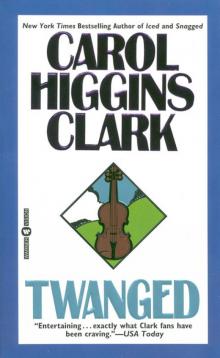 Twanged
Twanged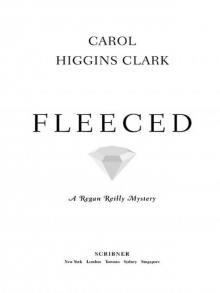 Fleeced: A Regan Reilly Mystery
Fleeced: A Regan Reilly Mystery Iced
Iced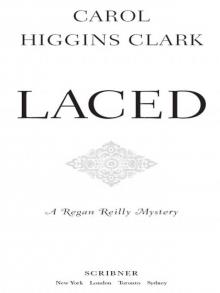 Laced
Laced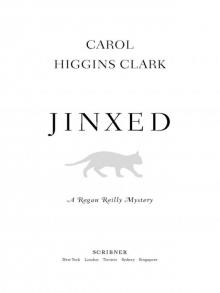 Jinxed
Jinxed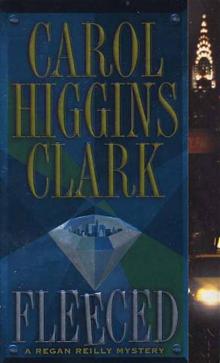 Fleeced
Fleeced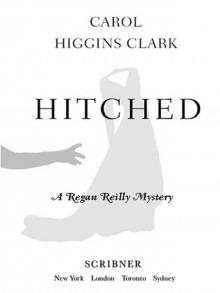 Hitched
Hitched Gypped
Gypped He Sees You When You're Sleeping
He Sees You When You're Sleeping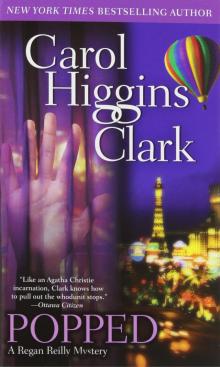 Popped
Popped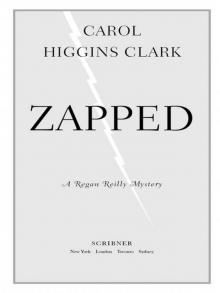 Zapped
Zapped Decked
Decked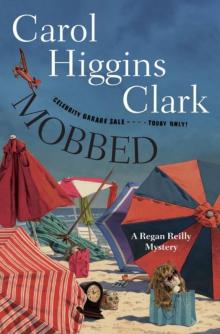 Mobbed
Mobbed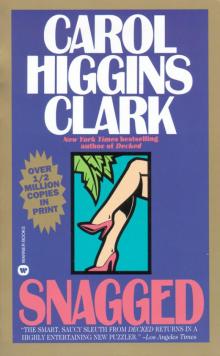 Snagged
Snagged Burned
Burned